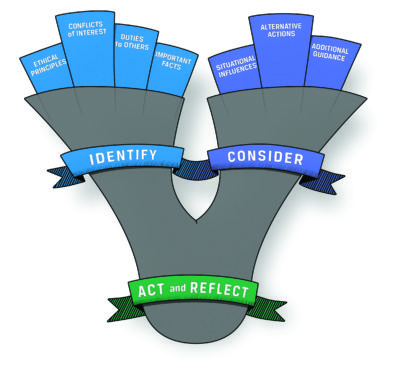Ethics in Practice: Does Trade Execution Venue Matter? Week of 9 July Case and Analysis
Check out the analysis for this week’s case (9 July) to see how you did in practicing your ethical decision-making skills.
Getting best execution for trades is important for broker/dealers. So, does it really matter whether the venue is internal or external? Read about the actions of the head trader in this week’s case and then join the conversation to share whether you believe his actions are appropriate and what CFA Institute Standard of Professional Conduct applies.
Case
Eller is the head trader for a large, global investment adviser and broker/dealer firm. Eller executes the majority of customer orders internally but routes a significant portion of orders to other, outside broker/dealers for execution. Over a period of five years, Eller and the firm routed to outside venues 15.8 million orders that involved 5.4 billion shares worth more than $141 billion. Eller and the firm do not inform clients that trades are sometimes executed using outside venues. Eller’s actions are
- appropriate as long as Eller obtained best execution for the clients wherever the trade was executed.
- inappropriate because Eller is misleading clients regarding a material aspect of the investment process.
- appropriate because order execution venue diversification is an insignificant and routine aspect of the investment process.
- inappropriate because using outside broker/dealers to execute client trades could distort market prices.
Analysis
The execution of trades is a material aspect of the investment process. Investors can use the execution venue information provided by the firm to make strategic choices about their broker/dealer relationships and tactical routing decisions. Investors may also not want their orders routed to outside venues because it exposes important information about their investment strategy. In addition, listing outside trade executions as having occurred within the firm gives the misleading impression that the firm is a more active trading center than it actually is. Using outside broker/dealers is not, in and of itself, unethical and does not necessarily lead to distorting the market. Eller’s ability to obtain best execution for these trades does not absolve him of misleading the firm’s clients regarding a material aspect of the investment process. By providing inaccurate information to clients about how their trades were executed, Eller violated Standard I(C): Misrepresentation, which prohibits CFA Institute members from making any misrepresentation relating to investment actions. The best choice is B.
This case is based on a recent enforcement action and penalty by the US SEC.
Have an idea for a case for us to feature? Send it to us at [email protected].
More About the Ethics in Practice Series
Just as you need to practice to become proficient at playing a musical instrument, public speaking, or playing a sport, practicing assessing and analyzing situations and making ethical decisions develops your ethical decision-making skills. The Ethics in Practice series gives you an opportunity to “exercise” your ethical decision-making skills. Each week, we post a short vignette, drawn from real-world circumstances, regulatory cases, and CFA Institute Professional Conduct investigations, along with possible responses/actions. We then encourage you to assess the case using the CFA Institute Ethical Decision-Making Framework and through the lens of the CFA Institute Code of Ethics and Standards of Professional Conduct. Then join the conversation and let us know which of the choices you believe is the right one and explain why. Later in the week, we will post an analysis of the case and you can see how your response compares.
Image Credit: ©CFA Institute

